- Best free AI tools: HubSpot
- Best for AI-powered predictive forecasting: Zoho CRM
- Best for AI-recommended integrations: Pipedrive
- Best for writing emails with AI: Capsule
- Best for generating formulas and reports: monday CRM
- Best for AI-powered project management: ClickUp
- Best for AI task management: Bitrix24
In addition to core and advanced technical offerings, the top customer relationship management software (CRM) now implements more artificial intelligence features. These AI-powered tools provide valuable automations, insights, and analytics that can streamline an organization’s end-to-end sales process. AI CRM software can also create marketing content, implement lead nurturing strategies like emails or dialing, and pull detailed reports in moments.
1
monday CRM
Employees per Company Size
Micro (0-49), Small (50-249), Medium (250-999), Large (1,000-4,999), Enterprise (5,000+)
Any Company Size
Any Company Size
Features
Calendar, Collaboration Tools, Contact Management, and more
2
HubSpot CRM
Employees per Company Size
Micro (0-49), Small (50-249), Medium (250-999), Large (1,000-4,999), Enterprise (5,000+)
Micro (0-49 Employees), Medium (250-999 Employees), Large (1,000-4,999 Employees), Small (50-249 Employees)
Micro, Medium, Large, Small
3
Zoho CRM
Employees per Company Size
Micro (0-49), Small (50-249), Medium (250-999), Large (1,000-4,999), Enterprise (5,000+)
Any Company Size
Any Company Size
Features
Calendar, Collaboration Tools, Contact Management, and more
Top AI CRM software comparison
The top CRM solutions that offer notable AI tools for marketing and sales automations are, as expected, also top general CRM providers, including HubSpot, Zoho CRM, monday CRM, and ClickUp.
In addition to the core CRM features users might expect from these technical CRM software, top features worth calling out are pipeline management, native or third-party integrations, AI-powered reporting or analytics, and the availability of a mobile application for users to access on the go.
| Software | Star rating | Pipeline management | AI assistant | AI-powered analytics | AI content generation | Free tier | Starting price* |
|---|---|---|---|---|---|---|---|
| HubSpot | 4.4/5 | Yes | No | Yes | Yes | Yes | $15 per user per month |
| Zoho CRM | 4.3/5 | Limited | Yes | Yes | Yes | Yes | $14 per user per month |
| Pipedrive | 4.4/5 | Yes | Yes | No | Yes | No | $14 per user per month |
| Capsule | 4/5 | Limited | No | Limited | Yes | Yes | $18 per user per month |
| monday CRM | 3.5/5 | Yes | Yes | No | Yes | Limited | $12 per user per month |
| ClickUp | 4.1/5 | Yes | Yes | Limited | Yes | Yes | $7 per user per month |
| Bitrix24 | 4.1/5 | Yes | Yes | Limited | Yes | Yes | $49 per 5 user per month |
| *Pricing is based on annual subscription rates for paid tiers. | |||||||
Features
- Lead management and prospecting: Manage leads and their associated activities for reps to easily engage and nurture them closer to a sale.
- Playbooks: Create process outlines for reps to reference, such as scripts, competitor battlecards, positioning guides, and more.
- AI blog writing: Generate fresh and branded content with an AI-powered blog writing tool that users can edit for added customization.
HubSpot pros and cons
| Pros | Cons |
|---|---|
| 24/7 email and chat support. | No free trial. |
| Offers an intuitive user interface. | Pricey paid tiers compared to others. |
| Over 1,500 apps available for integration. | No live support available for users of the free tier. |
Zoho CRM: Best for AI-powered predictive forecasting

Zoho CRM is a powerful CRM tool that supports customer-facing teams with personalized automations and solutions. As a collaborative and analytical CRM, Zoho CRM offers a comprehensive analytics suite that gives users a bird’s eye view of their business with custom dashboards. The AI assistant, Zia, offers advanced predictive forecasting that can suggest both company-wide and individual targets based on historical data. The tool can inspire healthy, competitive sales by visualizing achievable targets for reps.
Why I chose Zoho CRM
Zoho CRM continues to be among our top-ranking CRM software due to its competitive pricing, core features, and customization opportunities. Its team collaboration, marketing, and project management tools make it a great option for organizations that want a strong platform with AI sales and marketing functionality.
Zoho CRM’s artificial intelligence tools, specifically the AI assistant Zia, are only available in the top two pricing tiers, Enterprise and Ultimate. If you’re looking for a provider with AI accessibility in its free or standard subscriptions, check out HubSpot.
SEE: For more information, check out our full review of Zoho CRM.
Pricing
- Free CRM: Free for up to three users and comes with lead and document management and a mobile app.
- Standard: $14 per user per month, billed annually, or $20 per user when billed monthly.
- Professional: $23 per user per month, billed annually, or $35 per user when billed monthly.
- Enterprise: $40 per user per month, billed annually, or $50 per user when billed monthly.
- Ultimate: $52 per user per month, billed annually, or $65 per user when billed monthly.
Features
- Sales process builder: Create a universal sales process with actionable steps for sales reps to follow in detail.
- Customer portals: Offer prospects a self-service tool where they can view an organization’s products or services to make purchasing decisions.
- Sales forecasting: Make accurate forecasts around future sales with AI predictions to measure success against current sales.
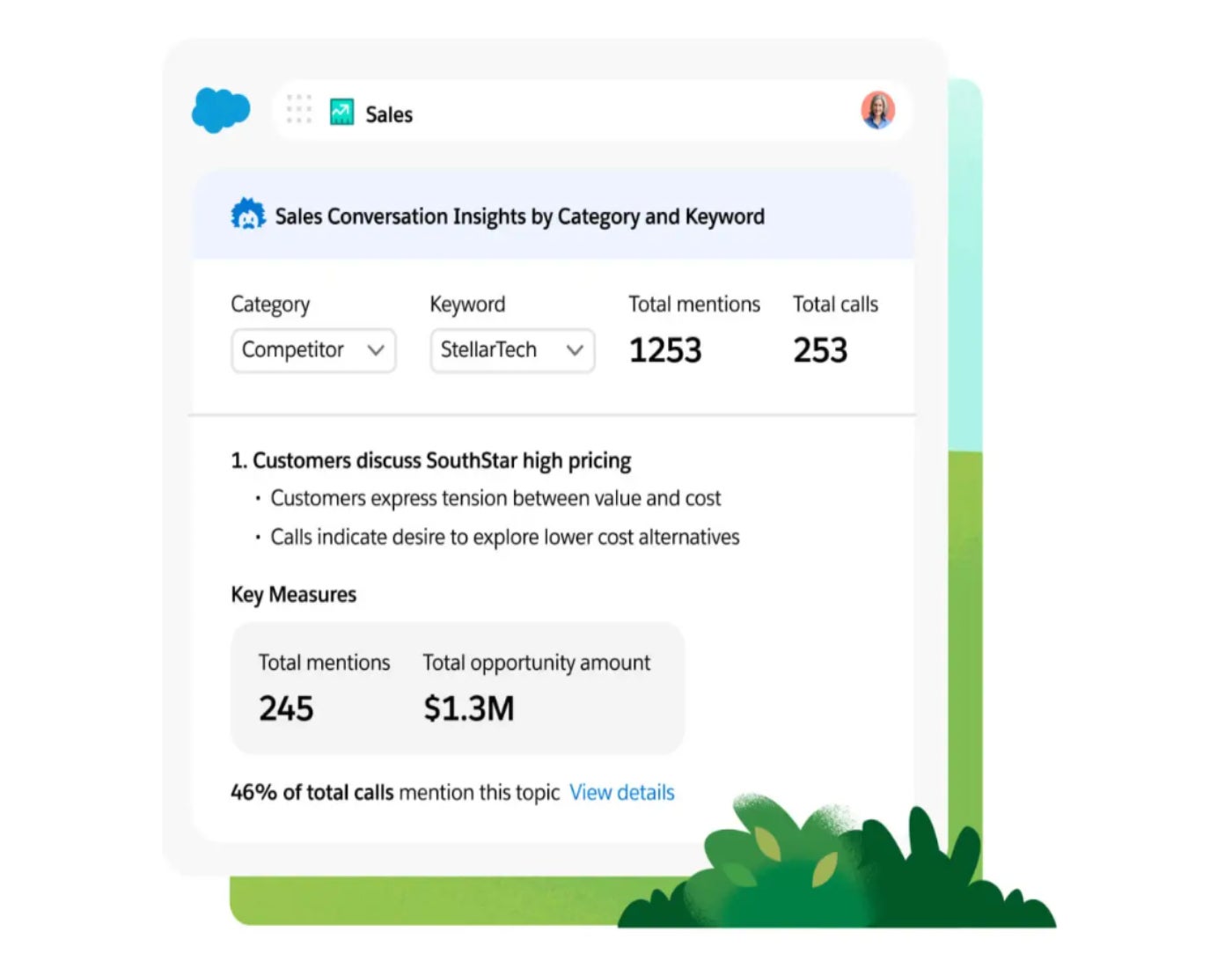
Zoho CRM pros and cons
| Pros | Cons |
|---|---|
| 15-day free trial. | No available social media integration in the free tier. |
| 24/7/365 data security. | Some users report poor UI and UX. |
| Offers workflow automations for each tier. | AI tools are only available in higher-paid tiers. |
Pipedrive: Best for AI-recommended integrations

Users of Pipedrive can receive tailored AI app recommendations to integrate with the CRM software. The recommendations are based on the unique needs of your business while strategizing the best way to optimize the use of the platform. This special AI feature is also available on all paid tiers that Pipedrive offers. With this tool and Pipedrive’s other AI features, businesses can experience enhanced efficiency and streamlined workflows while innovating sales processes.
Why I chose Pipedrive
Pipedrive is a powerful sales CRM software that allows users to create custom pipelines and track activity and deals from intuitive dashboards. While there isn’t a free-for-life option, Pipedrive’s paid plans are affordably priced and offer premium add-ons for even more customization. Pipedrive also offers industry specialization for a variety of niche markets, allowing the platform to serve businesses of all sizes and solutions.
Pipedrive’s AI features are slightly limited compared to others on this list, meaning they’re low in capabilities, still in beta release, or are only available on the higher paid tiers. If you want a CRM tool with more consistent AI functionality throughout the software, I suggest looking into HubSpot for their tools and free version.
SEE: For more insight into this provider, check out our Pipedrive review.
Pricing
- Essential: $14 per user per month, billed annually, or $24 per user when billed monthly.
- Advanced: $29 per user per month, billed annually, or $39 per user when billed monthly.
- Professional: $49 per user per month, billed annually, or $64 per user when billed monthly.
- Power: $64 per user per month, billed annually, or $79 per user when billed monthly.
- Enterprise: $99 per user per month, billed annually, or $129 per user when billed monthly.
*Pipedrive has three different pricing tiers, based on country and geographic location. This pricing reflects what I see, based on U.S. pricing.
Features
- Security center: Set rules and alerts and view individual or team access and device logs.
- AI conversation summary: Condense emails into brief summaries that reps can use to quickly understand main points and save time.
- AI sales assistant: Utilize an AI assistant to identify sales patterns, recommend high-potential deals, next actions, and actionable insights.
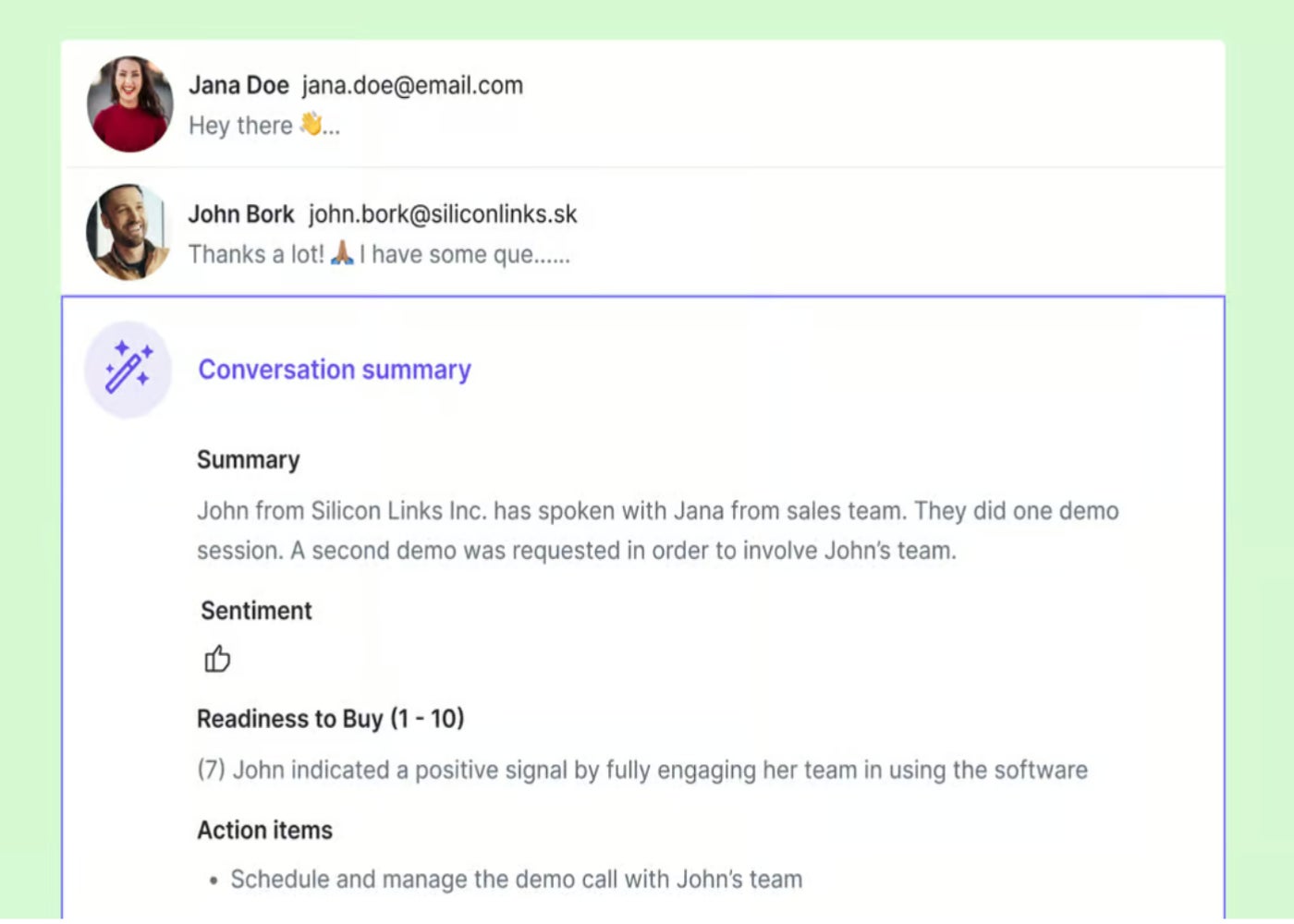
Pipedrive pros and cons
| Pros | Cons |
|---|---|
| 14-day free trial. | Doesn’t offer a free version. |
| Offers 24/7 customer service. | Users report occasional email glitches. |
| 400+ integrations. | Users report limitations when generating advanced reports. |
Capsule: Best for writing emails with AI

Capsule is easy-to-use CRM software that supports full sales cycle contact management. The platform offers an AI-powered content assistant that can help organizations produce email copy quickly. This feature allows users to spend valuable time doing other sales tasks and benefit from the efficiency and speed of AI-powered content creation while still being in control by enabling edits as needed.
Why I chose Capsule
Users of Capsule describe it as a simple online CRM provider with all the essential core sales and relationship management tools. Capsule scores highly for its ease of use and cost compared to other general CRM software. Its free version allows access for up to two users, making it an affordable option with its AI content assistant included in each tier.
While Capsule’s AI content can be extremely beneficial for streamlining marketing emails to leads, the platform lacks AI-powered tools for reporting or analytics. If you’re looking for a provider with AI capabilities for data and analytics, check out Zoho CRM.
Pricing
- Free tier: Free for up to 250 contacts and 50MB of storage per account.
- Starter: $18 per user per month when billed annually, or $21 per user when billed monthly.
- Growth: $36 per user per month when billed annually, or $38 per user when billed monthly.
- Advanced: $54 per user per month when billed annually, or $60 per user when billed monthly.
- Ultimate: $72 per user per month when billed annually, or $75 per user when billed monthly.
Features
- AI content assistant: Generate a variety of content, such as sales emails, with filters regarding tone and length.
- Google Data Studio: Unify multiple data sources to create interactive dashboards and build reports.
- Opportunity filtering: Filter projects and forecasted data based on status, tags, milestones, and more.
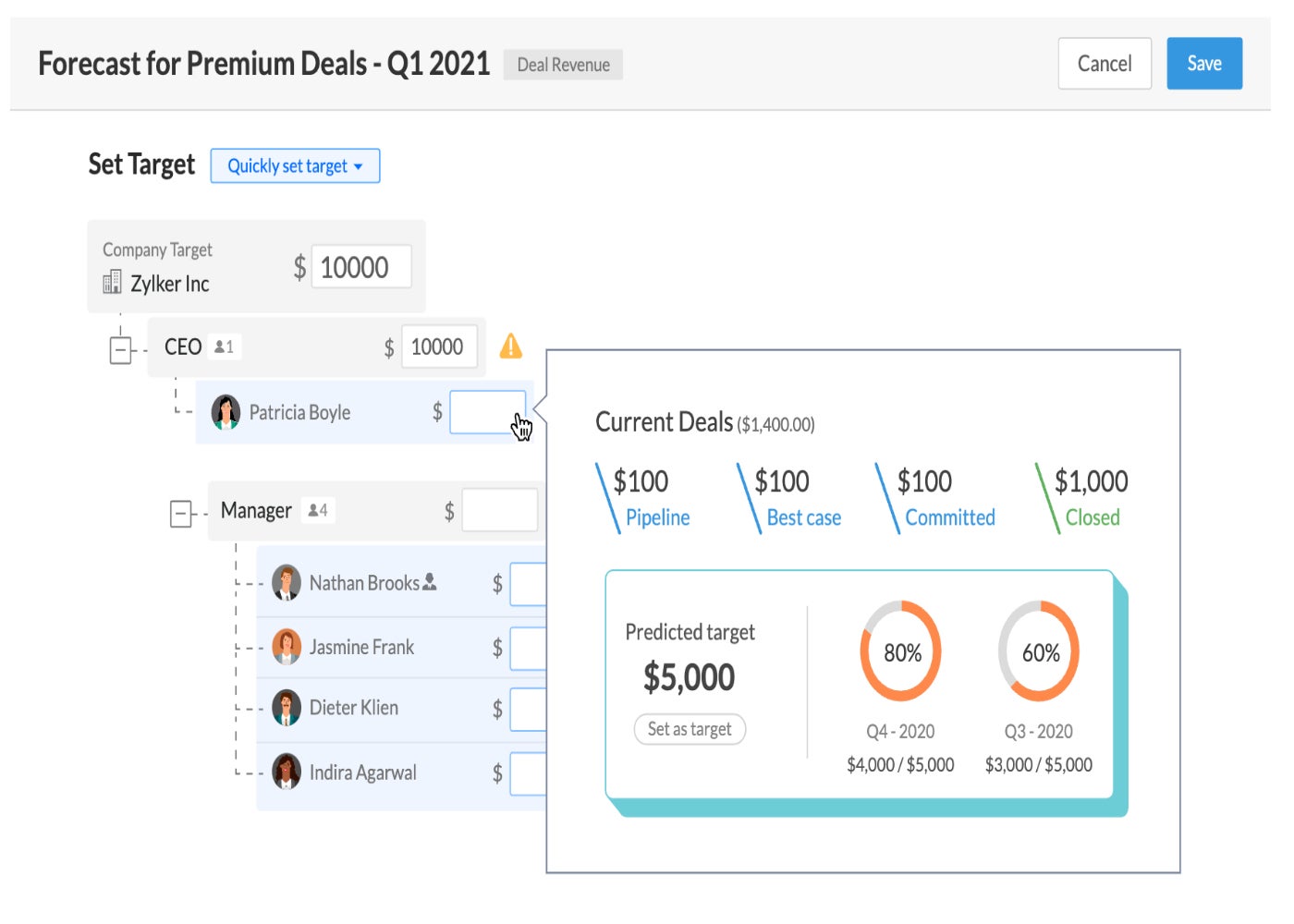
Capsule pros and cons
| Pros | Cons |
|---|---|
| 14-day free trial. | No custom automations available in the free tier. |
| 1,000+ available integrations. | No assigned sales teams or support. |
| Exporting for data security. | Doesn’t integrate with Outlook calendar. |
monday CRM: Best for generating formulas and reports

monday CRM has some AI features that are currently in beta release to users of their software. In addition to generating content, the monday CRM AI tool can also build formulas and reports. This formula builder will generate reports and insights from requests. For example, users can ask the AI assistant to create a formula to calculate close probabilities of each deal in a pipeline and the assistant will automatically generate a back end formula code that finds that calculation.
Why I chose monday CRM
monday CRM is a flexible and intuitive CRM software. Its pipeline and deal management tools make it easy to monitor ongoing business as well as projects. monday CRM’s automations are extensive, allowing users to completely customize their workflows and have tasks and updates logged without reps needing to lift a finger.
While monday CRM does have AI capabilities, there are others on this list that are more affordable and have more advanced AI tools. If you’re after a stronger AI-powered tool, I suggest checking out HubSpot or ClickUp.
SEE: Want to know more? Read our monday CRM review.
Pricing
- Free version: Basic CRM offerings that are only available for students and nonprofit organizations after submitting an application.
- Basic CRM: $12 per user per month when billed annually, or $15 per user per month when billed monthly.
- Standard CRM: $17 per user per month when billed annually, or $20 per user per month when billed monthly.
- Pro CRM: $28 per user per month when billed annually, or $33 per user per month when billed monthly. T
- Enterprise CRM: Contact monday.com for a quote.
Features
- Mobile app: Access all the same contact information, deal status, and account history on the go with the Android or iOS mobile app.
- Sales tracking: Get a bird’s eye view of high level sales data like attainment, headcounts, and performance tracking.
- AI-generated formulas: Generate custom formulas in fields that reflect quick data insights and reports.
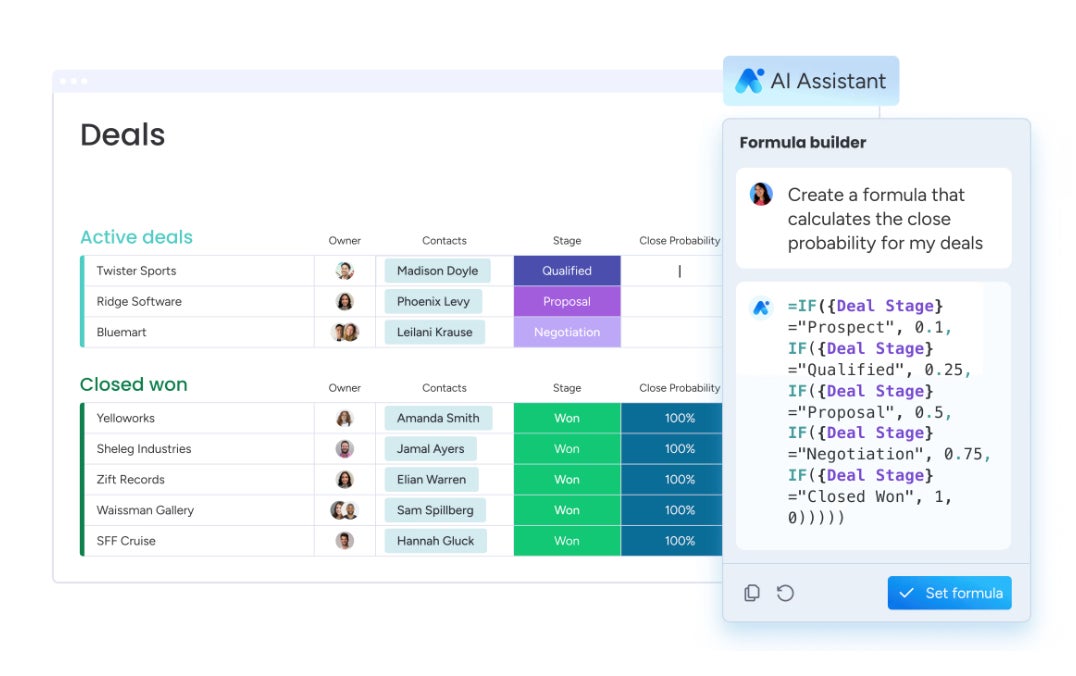
monday CRM pros and cons
| Pros | Cons |
|---|---|
| 14-day free trial. | The free plan is only available to qualified users after an approval process. |
| Offer unlimited contacts in the basic plan. | Lead scoring and HIPAA compliance are only available in the highest paid tier. |
| Integrates with Google, Microsoft, and more. | Mass emails and mass email tracking is only available in the Pro and Enterprise plans. |
ClickUp: Best for AI-powered project management

ClickUp offers a variety of AI-powered tools that can automate tasks, progress updates, and stand-ups for projects of any scale. Data auto-filling, substack planning, natural-language AI builders, and contextual Q&As on lists and projects are all accessible through ClickUp. This way, users can stop spending time on manual and repetitive work with accurate AI updates and workflows.
Why I chose ClickUp
ClickUp is an all-in-one solution that is customizable and scalable for businesses that need a collaborative AI-powered tool. The product itself can include project and knowledge management, product development, resource management, collaboration, and workflow management tools. ClickUp can also be a white label CRM, if you purchase the Enterprise plan.
ClickUp is great for managing ongoing projects and business pipelines. If you want an AI tool that can also help manage lead generation and marketing efforts, I suggest HubSpot or Bitrix24.
Pricing
- Forever Free: Free for unlimited users, allowing up to 100 MB of storage, collaborative docs, real-time chat, and more.
- Unlimited: $7 per user, per month when billed annually or $10 when billed monthly.
- Business: $12 per user, per month when billed annually or $19 when billed monthly.
- Enterprise: Contact ClickUp directly for a quote.
Features
- Time tracking: Track individual or team time, set estimates, add notes, and view reports.
- Portfolios: Organize all your team or departments monthly, quarterly, or annual objectives and schedules in one place.
- Automated project summaries: Receive summaries and progress updates from CLickUp’s AI assistant, Brain.
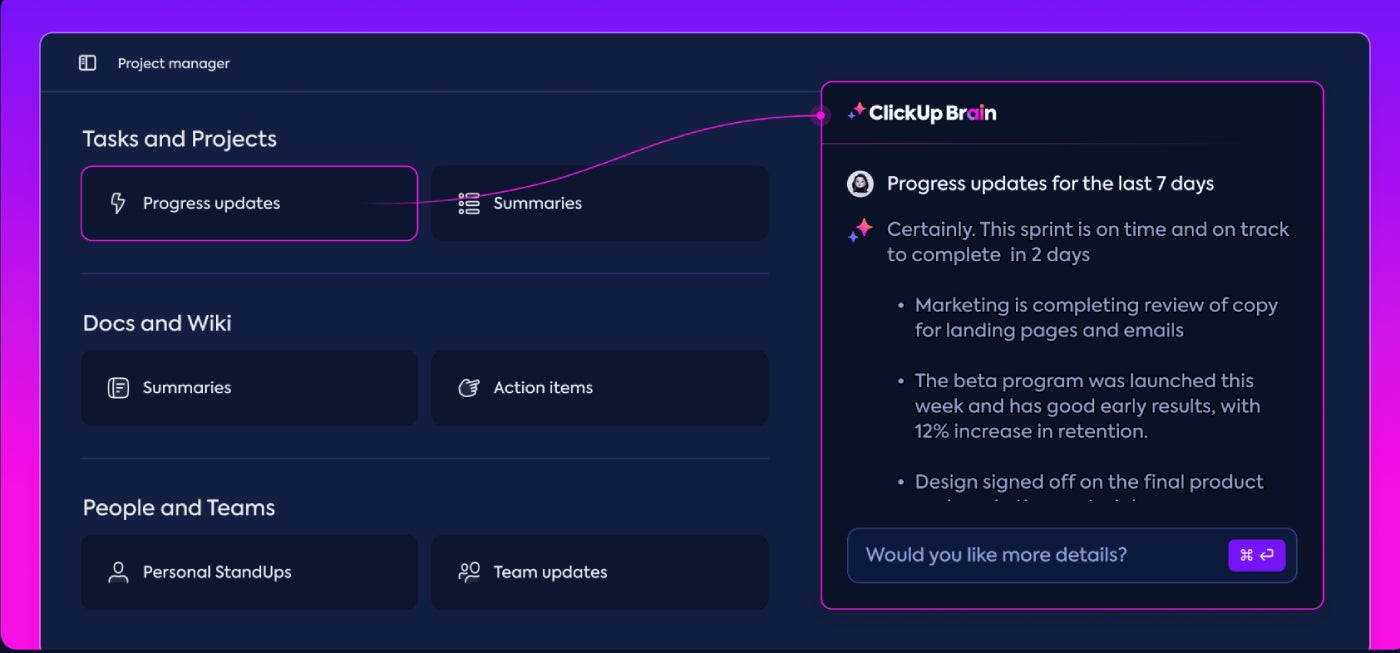
ClickUp pros and cons
| Pros | Cons |
|---|---|
| 14-day free trial. | Advanced automations are only available in the two highest tier paid plans. |
| Provides automated standups and team updates. | Caters best to businesses that sell products, or have development teams. |
| The forever free plan supports unlimited users. | Limited marketing integrations. |
Bitrix24: Best for AI task management

Bitrix24’s AI assistant, CoPilot, helps users create new tasks by coming up with brief and understandable task descriptions based on the submitted prompt and even generate a checklist that’s appropriate for the task. The CoPilot is available for tasks and comments with a built-in translator and grammar check tool. This will simplify task creation and ongoing progress tracking so sales reps can focus on completing the activity and not tracking it down in the app.
Why I chose Bitrix24
Bitrix24 markets itself as the ultimate workspace because it offers fully-functional CRM software plus ecommerce, HR, and project management features. With this suite of tools, users can manage business processes from beginning to end. This includes marketing, online lead generation, invoices, and payment tracking.
Bitrix24’s pricing plan is unique compared to other CRM providers. If you prefer to purchase a CRM priced per user, I recommend ClickUp, Zoho CRM, or HubSpot for an affordable plan.
SEE: Head over to our Bitrix24 review for more details.
Pricing
- Free: Free for unlimited users but only supports up to 5 GB of storage space and limited communication features.
- Basic: $49 per organization for five users when billed annually, or $61 for five users when billed monthly.
- Standard: $99 per organization for 50 users when billed annually, or $124 for 50 users when billed monthly.
- Professional: $199 per organization for 100 users when billed annually, or $249 for 100 users when billed monthly.
- Enterprise: Billing starts at $399 per organization for 250 users when billed annually, or $499 for 250 users when billed monthly.
Features
- Workflow automation: Automate routine tasks and operations to increase individual and team efficiency.
- Omnichannel communication: Track all internal and external communication from private chats, history, video calls, and video conferences.
- Task creation: Create and assign new tasks with just a click and it will notify you when they’re completed.
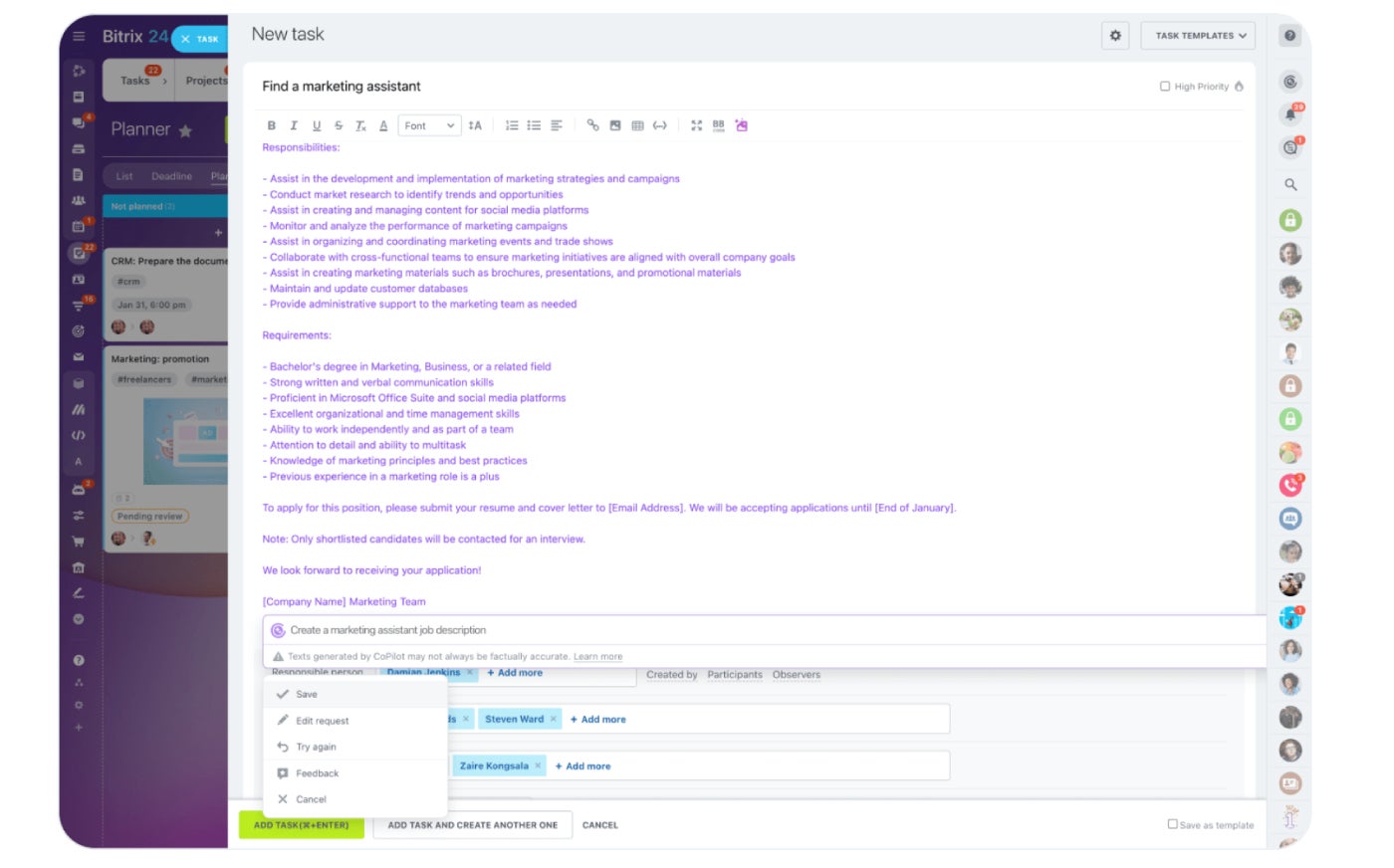
Bitrix24 pros and cons
| Pros | Cons |
|---|---|
| 15-day free trial. | Users report poor customer support. |
| Integrates with native applications through their REST API. | Reports of laggy user interface. |
| Offers advanced ecommerce tools. | Advanced admin and HR tools are only available in the Enterprise plan. |
How do I choose the best AI CRM software for my business?
After identifying these top CRM providers with advanced AI tools, the next step would be to request demos or sign up for free trials from some of the providers on this list. I also recommend compiling a list of exactly what you hope to gain from implementing CRM software. This way, you can begin communicating directly with the provider and start onboarding the software that works best for your business needs.
Below are questions to consider asking when choosing AI CRM software:
- Does the free version offer the core features you need, such as list segmentation or advanced reporting?
- What is the total in-market expertise for your industry, if any?
- Is the CRM scalable and detailed enough to fit your small business or enterprise?
- Does the CRM software integrate with tools you already have in your tech stack?
FORUM: Here are some factors to consider when choosing a CRM.
What is AI CRM?
AI CRM refers to CRM solutions that have AI technology integrated throughout the system for users to access. CRM software with AI features can streamline workflows and sales processes by generating reports, summaries, and marketing content on behalf of individual users.
Depending on the provider and since AI tools are constantly evolving, features are often released in beta and can be accessed through different paid plans. In this era of AI software, most CRMs have it incorporated into their tool in one way or another.
Benefits of integrating AI into CRM
There are several benefits to implementing a CRM solution that offers AI capabilities. AI functionality can encompass a variety of features that enhance business operations and improve efficiency, making it a sought-after tool for teams managing customer relationships.
Here are five benefits of integrating AI into CRM:
- Predictive analytics: Receive reports that forecast sales trends, anticipated deal profits, potential churn rates, and more, to help build strategies to achieve the metrics you’re after.
- Enhanced customer support: Tailor customer support to engage with leads with personalized communication through AI-powered chatbots.
- Content generation: Generate content in seconds that can be used in mass emails, follow-up communication, marketing campaigns, and social media posts.
- Automations: Set triggers for AI assistants to handle repetitive tasks and activities like follow-up reminders, appointment scheduling, and pipeline updates.
- Reduced errors: Minimize the opportunity for human error when AI handles data and contact importing, communication, and predictions.
Frequently asked questions (FAQs)
How is AI changing CRM?
The introduction of AI technology in CRM software is enhancing their overall purpose, which is providing efficient workflows for sales processes. AI tools are improving typical CRM functionality by allowing for more advanced automations, in-depth data analysis and forecasting, and content generation.
Can we combine CRM and AI?
Absolutely. CRM products are quickly implementing AI-powered solutions into their platforms. CRMs are meant to provide customer insights and increase efficiency for sales processes and client relationships. AI functionality can do this and more. With AI assistants, summaries, and automations, users can now make more informed business and sales decisions.
What are the limitations of AI in CRM?
There are some limitations around AI technology for the platform itself as well as for the end user. AI tools are currently considered an advanced feature for CRM solutions, meaning access might be behind paywalls and exclusive to top-tier plans. Similar to other software adopting AI, CRMs with AI also create more security and data privacy concerns, so human oversight is still critical.
Can AI be used for CRM?
Yes, AI can be used in CRM software. In fact, AI is becoming a popular feature in a lot of generalized CRM applications. While some providers only make it accessible in higher-level paid tiers, it’s becoming a core feature that most CRM offer. AI-powered tools prioritize efficiency, and that is a sought-after benefit, especially for customer-facing teams.
Who is the leader in CRM?
The leading CRM providers in the market currently include HubSpot, Zoho CRM, Pipedrive, monday CRM, Creatio, and Bitrix24 to name a few. A few things all these solutions have in common are integrations, omnichannel communication, pipeline management, and reporting software. The best CRM for your organization is dependent on its in-market expertise, scalability, affordability, and business needs.
Review methodology
To fairly evaluate each provider’s AI CRM offerings, I used an in-house rubric with outlined criteria and subcategories with a special focus on AI features. After scoring each provider with our rubric, an algorithm calculated an overall star rating, which I used to assign each software an ideal use case.
Here’s a breakdown of the scoring criteria I followed:
- Cost: Weighted 25% of the total score.
- Core features: Weighted 25% of the total score.
- Customizations: Weighted 15% of the total score.
- Integrations: Weighted 15% of the total score.
- Ease of use: Weighted 10% of the total score.
- Customer support: Weighted 10% of the total score.







